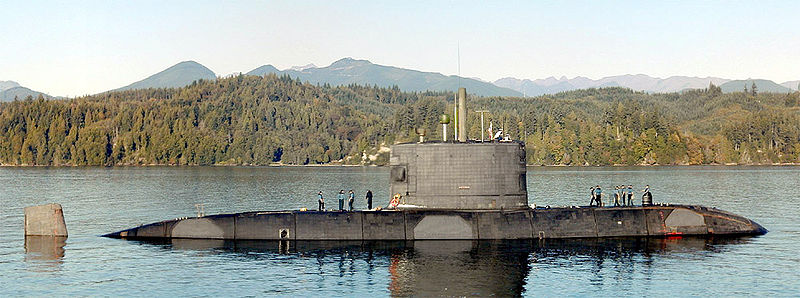In the National Post, Senator Pamela Wallin offers a counter-argument to John Ivison’s suggestion that the submarine fleet is a net drain on Canada’s military resources (linked from this post):
I’m with Vice-Admiral Maddison, who said, “For a G8 nation, a NATO country like Canada, a country that continues to lead internationally and aspires to lead even more, I would consider that [cancellation of the program] to be a critical loss of a fundamental capability and a very difficult one to regenerate at a future date.” Submarines provide Canada the ability to add to our knowledge of what’s happening at sea, a way of moving around without being noticed and, if fighting breaks out, a unique strike capability in support of Canadian or allied forces.
Most importantly, Canada has the longest coastline in the world. We need to be able patrol it and to guard our three enormous ocean approaches — quietly and unseen. As well, 90% of the world’s trade moves on ships. Canada is heavily reliant on maritime trade, especially through sensitive narrow waterways like the Straits of Hormuz and Malacca. Some of that trade is threatened by piracy, a growing concern for all trading nations, especially off Africa’s east coast where pirates now range all the way east to India. These are not the charmingly rakish pirates that Hollywood portrays — they are brutal, ruthless criminals. Canada, as a maritime nation, needs to know what’s going on in all domains, including underwater, and to be able to fight back.

HMCS Victoria near Bangor. (Image from Wikimedia).
In spite of the tone of my comments in the earlier post (generally agreeing with Ivison’s criticisms), I’m pro-RCN and very much pro-submarine as part of our navy. But what we need are submarines that can perform the duties required, and ever since we acquired the Victoria class, they’ve signally failed to do this. Anyone who’s ever watched a WWII film or newsreel knows that submarines fire torpedoes — except the Victoria class, which still do not have effective torpedo armament. We bought these submarines in 1998. HMCS Victoria has been in commission since 2000 and we’re only just getting around to test-firing a torpedo later this year? This is insane.
Of course, it’s not fair to blame the RCN for all the problems: the government of the day bought the subs on the cheap and then didn’t fully fund the necessary repairs to bring the boats back into operation in a timely fashion (but the military may not have done proper due diligence before recommending the purchase, either). Today’s government may cut funding as part of the austerity budget we’re rumoured to be facing soon. If so, we can expect fewer days when any of our submarines are in the water, operational, and fully crewed.
![]() My weekly column at GuildMag is now posted: http://www.guildmag.com/this-week-in-guild-wars-2-12. This week, there’s less raw gameplay footage from the press closed beta weekend and more analysis and further spectulation as we wait for the next Guild Wars 2 beta event later in March. More than a million eager players are watching their email inboxes for one of those treasured beta invitations (although a million applied, ArenaNet is inviting an unspecified number to take part in the next beta event).
My weekly column at GuildMag is now posted: http://www.guildmag.com/this-week-in-guild-wars-2-12. This week, there’s less raw gameplay footage from the press closed beta weekend and more analysis and further spectulation as we wait for the next Guild Wars 2 beta event later in March. More than a million eager players are watching their email inboxes for one of those treasured beta invitations (although a million applied, ArenaNet is inviting an unspecified number to take part in the next beta event).



